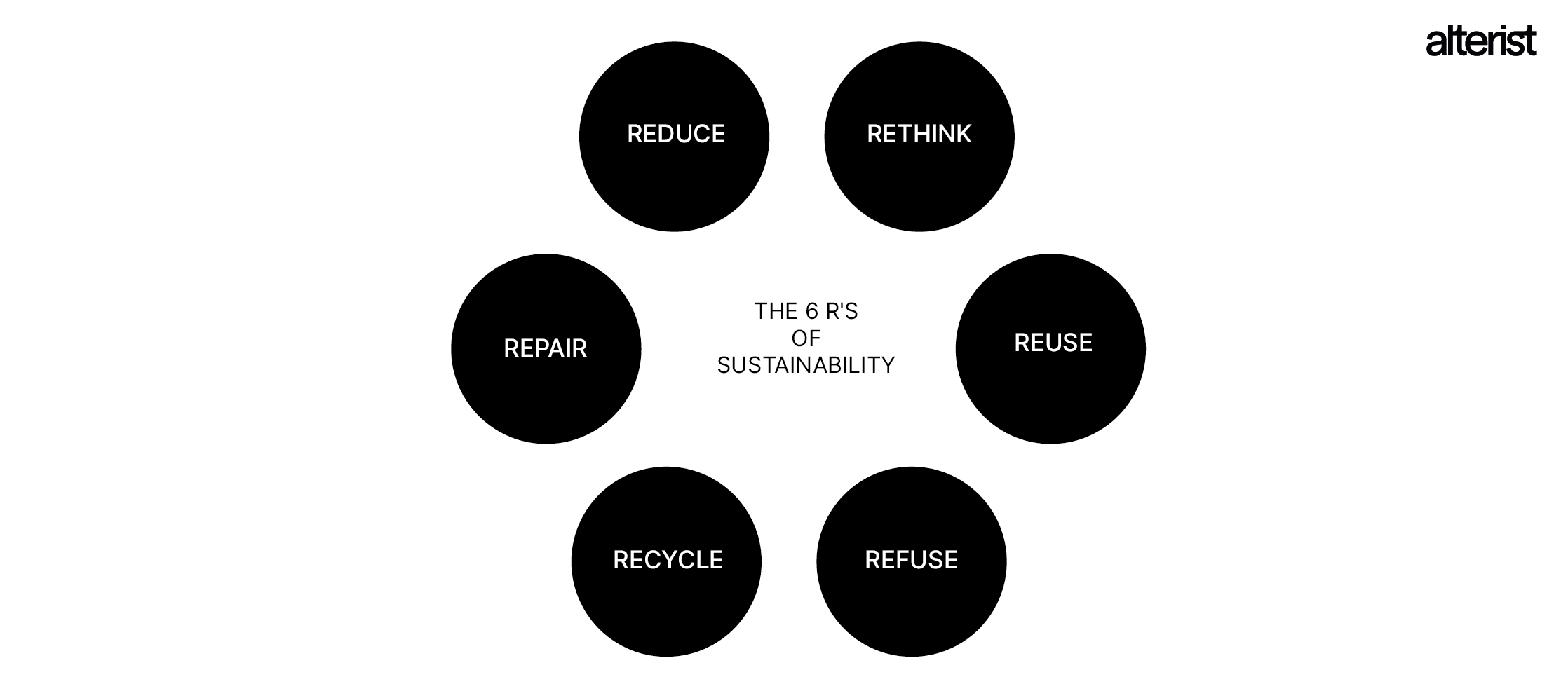
The 6 R's Of Sustainability: Your Guide to Consious Consumption
Discover the 6 R's of sustainability—Rethink, Refuse, Repair, Reduce, Reuse, and Recycle—and learn how these principles can be incorporated into your daily life to make a positive impact on the environment.
What are the 6 R’s of sustainability?
Rethink. Refuse. Repair. Reduce. Reuse. Recycle.
The 6 R's embody the fundamental principles of sustainability, providing a comprehensive understanding of what it truly means to live an eco-friendly lifestyle. These core values not only help demystify the concept of sustainability, but they also offer actionable steps that can be incorporated into your daily life to make a tangible, positive impact on the environment.
Now that you understand what the 6 R's of sustainability are, it's time to dive deeper into the meaning and significance of each term. By exploring these concepts, you'll discover practical ways to apply them in your everyday life to make a positive impact on the planet..
Rethink
It is estimated around 1.2 million tonnes of clothing and textiles in the UK end up at the landfill each year. This highlights the importance of understanding your shopping habits and their environmental impact. Rethinking involves changing your mindset and making more conscious decision when you shop. Ask yourself questions like, do I really need another outfit? Is this a sustainable fashion brand? If you’re more aware of the impact your choices can have on the environment, then you can make more ethically conscious decisions in your everyday life.
Refuse
‘Refuse’ is about resisting the urge to buy and use items you don’t need. Single use items such as plastic straws and carrier bags can have devastating effects on the environment, refusing to buy these items help reduce wastage and positively contribute towards a sustainable future. This can also mean boycotting brands due to their quality, their packaging or their ethics. Shop with your morals and refuse to spend your money on brands that don’t priroites eco-friendly values.
Repair
When items we own become damaged, it can tempting to throw it out, and simply replace it with a new one. However, as often the items we throw out can easily end up at a landfill, this contrinbutes to wastage and in turn, it can result in more environmental damage. Instead of throwing our or recycling an item, why not consider repairing it. Along with being cost-effective, by taking a repair first approach you will extend the life of an item, saving money while reducing waste.
Reduce
Consume less. Waste less. Reducing the amount of items we buy can be beneficial for the environment as it reduces the level of waste we produce. Single use plastic bags consumption has reduced by 20% since the 10p charge was introduced. Less usage of plastic bags means less plastic bags ending up being thrown away and damaging the environment. It's important to cut down on what we can as this can largely benefit our ecosystem.
Reuse
Items that have outgrown their original purpose can be creatively repurposed or upcycled for alternative uses. For instance, a plastic container can be transformed into a storage solution or a unique decorative piece. Reusing and upcycling old items not only help reduce waste but also extend the lifecycle of an item without the need for any additional resources. This makes reuse and upcycling some of the most sustainable actions you can take today, preventing items from being discarded in landfills, while creating something unique and new.
Recycle
If an item cannot be reused or upcycled, recycling is the next best option. Recycling transforms waste objects into new materials, reducing resource wastage and addressing crucial environmental issues. A recycled tin can saves enough energy to power a TV for 3 hours, and up to 60% of household rubbish can be recycled or composted. As a last resort, after actioning all the other R's, recycling serves as a sustainable action that helps to reduce waste and our impact on the planet.
Embracing the 6 R's of sustainability empowers you to make a meaningful difference in the world by adopting an eco-friendly lifestyle. By incorporating Rethink, Refuse, Repair, Reduce, Reuse, and Recycle into your daily habits, you actively contribute to the preservation of our planet's resources and a greener future.
Written By Onikepo Abudu
15th May 2023